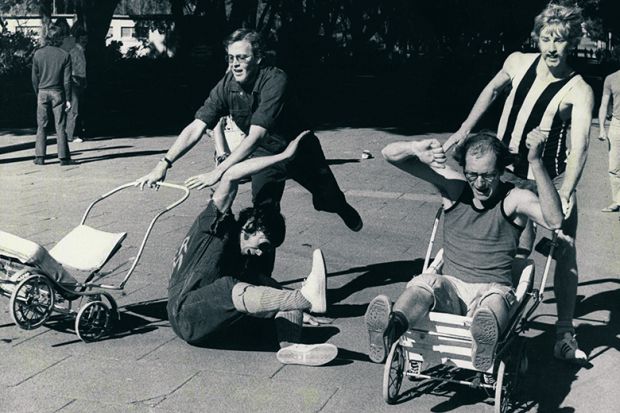Corporate skill sets – particularly from the banking, finance and insurance sectors – are the dominant traits of Australian university governors, a Times Higher Education analysis has found.
Governing councils have reoriented towards financial services over the past decade, with specialist academic skills giving way to high-level experience in investment, infrastructure and risk management.
Thirty-four per cent of university council members have had primarily corporate careers, with professional academic administrators claiming just 18 per cent of positions. Elected university staff constitute 14 per cent of members, down from 17 per cent a decade ago.
The change is particularly evident among university chancellors, 53 per cent of whom have mainly corporate backgrounds, compared with 35 per cent in 2009. Career academics comprise just 3 per cent of chancellors, down from 14 per cent a decade ago, with the proportion of former senior politicians and public servants slipping from 41 per cent to 39 per cent.
Australia’s chancellors include current and recent chairs of some of the country’s biggest financial services companies. Council members have served on the boards of the “big four” retail banks as well as investment banks such as Macquarie.
Many have also held senior executive roles throughout the financial services sector – an industry in disgrace after a recent royal commission uncovered a litany of deceit, fraud and conflicts of interest.
Shareholder advocate Stephen Mayne said universities risked tarnishing their reputations by associating with people who had run such companies. “Australia’s long had a problem with directors failing at one company and not being held to account at another,” he said.
But Mr Mayne said “workload challenge” was a bigger issue, with members spreading their time too thin by sitting on too many boards. “For me that’s the biggest red flag – people who are overloaded and just don’t have time to devote to their roles as university director.”
The analysis came as the release of Victorian universities’ annual reports this month revealed that corporate-style inflation of vice-chancellors’ salaries continued unabated last year. Six of the state’s eight comprehensive universities paid their chief executives more than they had in 2017, with only Victoria University’s Peter Dawkins and Deakin University’s Jane Den Hollander missing out on rises ranging between A$20,000 (£10,750) and A$285,000.
The average earnings across the eight university leaders rose above A$1 million to about A$1.04 million. The University of Melbourne’s retiring vice-chancellor, Glyn Davis, pocketed about A$1.59 million, a new record for an Australian vice-chancellor.
A Melbourne spokeswoman said Professor Davis’ package had included superannuation and “a significant attribution” in the form of the university residence, which was also used for official functions. She said his pay had been determined by a remuneration committee that included the chancellor and other council members.
Commentators say councils’ corporate disposition has fostered vice-chancellors’ salaries akin to those in big business.
In Queensland, where annual reports were released earlier this year, five vice-chancellors’ salaries rose by an average of A$53,000 to A$953,000. But the state average declined to A$909,000 because of lower chief executives’ salaries at Queensland University of Technology and Central Queensland University, both of which have recently installed new vice-chancellors.
POSTSCRIPT:
Print headline: Corporate breed rules the boards
Register to continue
Why register?
- Registration is free and only takes a moment
- Once registered, you can read 3 articles a month
- Sign up for our newsletter
Subscribe
Or subscribe for unlimited access to:
- Unlimited access to news, views, insights & reviews
- Digital editions
- Digital access to THE’s university and college rankings analysis
Already registered or a current subscriber? Login










